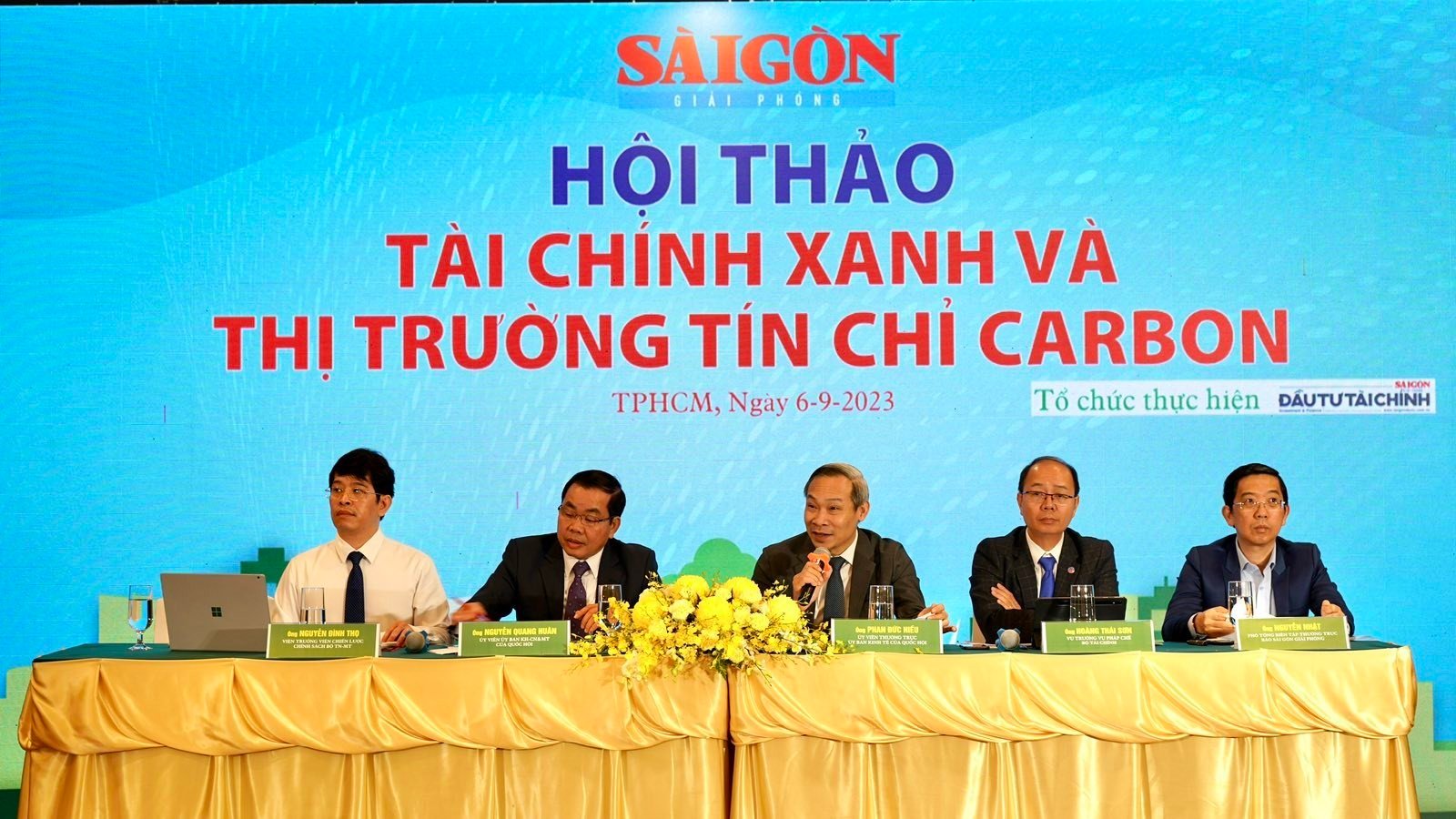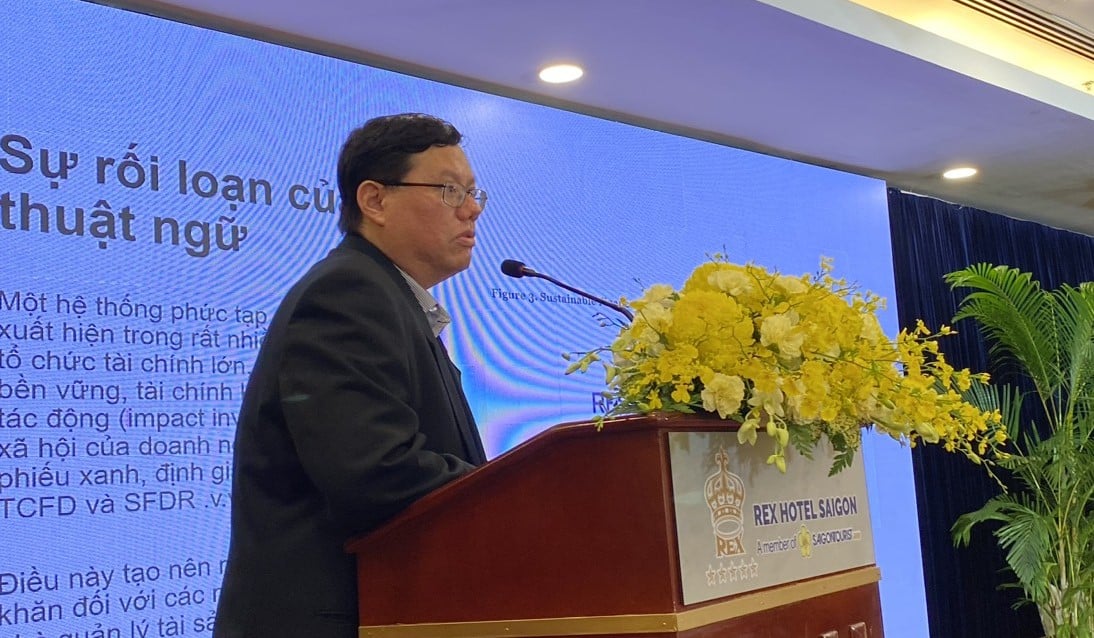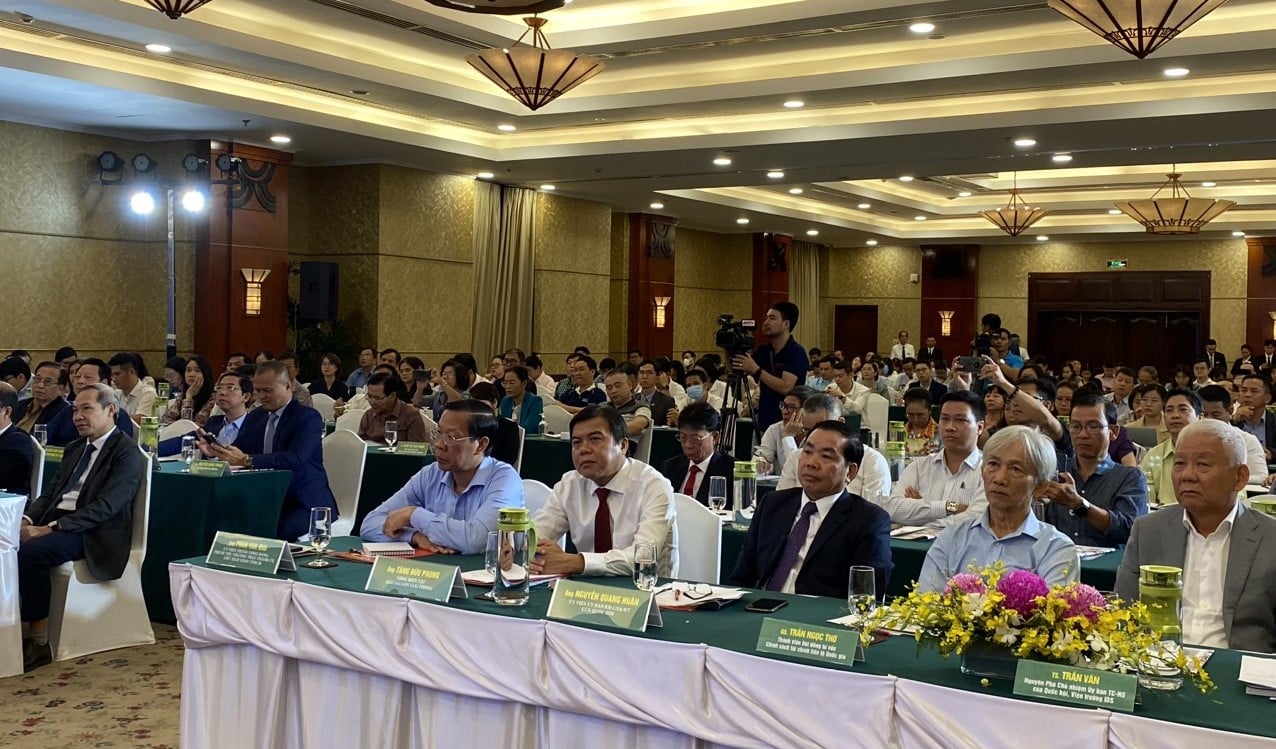May 24, 2025 | 16:21 GMT +7
May 24, 2025 | 16:21 GMT +7
Hotline: 0913.378.918
May 24, 2025 | 16:21 GMT +7
Hotline: 0913.378.918

A workshop on "Green finance and the carbon credit market" was held on September 6 in Ho Chi Minh City.
In his introductory remarks to the workshop on "Green finance and the carbon credit market", Mr. Phan Van Mai, Chairman of the Ho Chi Minh City People's Committee, stated that green finance should be viewed as a versatile tool to encourage green growth.
Additionally, green finance has become a measuring tool for the sustainable development of major cities similar to Ho Chi Minh City. It raises awareness regarding the importance of the environment through exploitation, production and consumer behavior.
The workshop was attended by several prestigious figures including Professor Tran Ngoc Tho, Dr. Truong Van Phuoc, Dr. Nguyen Tri Hieu, Dr. Le Dat Chi, Ph.D. Tran Van, Dr. To Xuan Phuc, etc.
The terms "green finance" and "carbon credit market" are believed to be relatively new yet hold important social messages according to experts. As a result, they must be widely popularized in social life.
In its 2022 National Report on Climate and Development, the World Bank emphasized the urgency of climate change adaptation in Vietnam. Accordingly, it requires the implementation of multiple policies and public-private investments in order to reduce carbon intensity in the country's development progress.
The World Bank estimated that Vietnam will need to invest at least 368 billion USD until 2040, which is equivalent to 6.8% of its GDP per year. Accordingly, approximately 254 billion USD will be needed for the investment in resilience and an additional 114 billion USD for the decarbonization journey as committed to the international community.
These World Bank's recommendations reminds that Vietnam will need significant investments in next thirty years, whereas the Government's resources can only partially meet the financial needs. Consequently, the issue of green bonds must be taken into account in order to support green finance.

Dr. Ho Quoc Tuan proposed Vietnam to promote green finance with green bonds.
Dr. Ho Quoc Tuan from the University of Bristol in the United Kingdoms suggested: "Green bonds are issued by the Government, local authorities, or businesses to mobilize capital for green and environmentally sustainable projects. They promote the transition to a low-emission economy. These bonds are issued with special provisions on debt repayment mechanism, recourse or non-recourse from the issuing organization.
Both green bonds and green credit are a tool to mobilize capital for green and environmentally sustainable projects that promote the transition to a low-emission economy. This is an approach to mobilize capital for long-term sustainable development. In addition, this is a source of capital that encourages businesses to adopt technologies that emit less emissions."
Carbon credit market is a type of market where carbon credit goods are exchanged, bought and sold through the amount of greenhouse gases reduced (emitted or absorbed) during operations between buyers and sellers.
A carbon market with clear, fair and transparent regulations based on the carbon pricing mechanism and the principles of "Fair trade" and "Polluter pays", will help countries and governments benefit from reducing emissions. Moreover, it helps restructure the economy with a focus on carbon neutrality and Net zero.
Businesses that sell quotas or carbon credits will earn profits, thereby further restructuring their operations and continuing efforts to reduce emissions. The buyer of carbon credits will benefit from ensuring compliance with regional and national regulations on quota allocation and facilitate the process of participating in exporting goods to various markets around the such as the EU, US and so on.
Long-term participation in the carbon market requires emission-emitting establishments and businesses to research and apply technological solutions and reduce emissions from internal resources (energy saving measures, change of technology, converting to renewable energy or upgrading to cleaner production technology). Additionally, they can research options for storing and absorbing carbon by promoting the planting of trees. The selection of measures to reduce or offset emissions will be based on the cost-benefit analysis for different businesses.
Most of the presentations at the workshop on "Green finance and carbon credit market" provided a similar recommendation: the carbon market in Vietnam must be built with a focus on integration and connection to global carbon markets. The connection to these trading systems (including both mandatory and voluntary carbon markets) will assist in managing the emission reduction goals of stakeholders. Furthermore, they will promote transparency in process of transferring, exchanging, and offsetting emission quotas and carbon credits between countries, regions, organizations, and businesses.
The organization and development of the domestic carbon credit market was first detailed under Article 139 of Vietnam's Law on Environmental Protection in 2020. Accordingly, the Ministry of Natural Resources and Environment is tasked with setting the total quota for Vietnam's quota exchange system, determining the quota allocation method as well as the carbon offset credit mechanisms applied in the quota exchange system.
Subsequently, the Government issued Decree 06/2022/ND-CP on January 7, 2022 which detailed the mitigation of greenhouse gas emissions, protection of the ozone layer. Additionally, the document specified that the carbon credit exchange will be established and tested starting from 2025.
The process of implementing carbon credit transactions and offsetting in Vietnam also complies with the Decision No. 888/QD-TTg dated July 25, 2022 on the results of the 26th Conference of the United Nations Framework Convention on Climate Change, and Decision No. 896/QD-TTg dated July 26, 2022 detailing the National Strategy on Climate Change until 2050.
The carbon credit market will help Vietnam maximize benefits from international trade such as the EU - Vietnam Free Trade Agreement; increase its ability to attract investment capital from foreign-invested businesses, and increase the competitiveness of its products, especially when exporting to demanding markets with high levels of environmental awareness.

Participants of the workshop on "Green finance and carbon credit market".
According to the project on Developing a carbon credit market drafted by the Ministry of Finance, Vietnam's carbon credit exchange will not officially operate until 2028. The price of Vietnam's carbon credits traded in the international market is considerably lower than that of the EU or the US. As a result, Vietnamese businesses must actively learn and update information regarding regulations, risks and solutions related to greenhouse gas emission reduction that directly and indirectly affect their operations.
In addition to the Government's efforts, the community, businesses and people must implement several key solutions in order to effectively establish and operate a carbon credit market. As a member of the National Assembly's Committee on Science, Technology and Environment, Mr. Nguyen Quang Huan emphasized: "It is necessary to develop an operating mechanism and a specialized agency in charge of the carbon credit market. In addition, a specialized agency is required to study and implement a carbon tax that increase budget revenue and offset the green financial fund.
An implementation roadmap must be established for each phase in order to develop appropriate supporting mechanisms and policies such as taxes, fees, capital, techniques, markets, planning and strategies, etc. These factors will help promote the effectiveness of green credit capital, and draw additional resources from domestic and foreign organizations to implement green projects".
Translated by Nguyen Hai Long

(VAN) In the tranquil wetlands of Van Long, there are quiet souls who guard the forests, nurture the waters, and oversee every bird and troop of langurs as protecting the essence of a living heritage.

(VAN) WWF, GIZ, IUCN, UNDP call for biodiversity conservation and sustainable development must be regarded as a unity in strategies for a green future.

(VAN) On celebration of International Day for Biological Diversity, Deputy Minister Nguyen Quoc Tri called for practical actions to address nature and biodiversity conservation.

(VAN) Dr. Hoang Thi Thanh Nhan – Deputy Director of the Nature and Biodiversity Conservation Agency – highlighted this on the International Day for Biological Diversity, May 22, 2025.
![Ho Chi Minh city adapts to climate change: [2] Accelerating action](https://t.ex-cdn.com/nongnghiepmoitruong.vn/608w/files/chiqk/2025/05/22/4024-4220-bien-doi-khi-hau-1-100626_766.jpg)
(VAN) Clearly recognizing the challenges posed by climate change, Ho Chi Minh city has swiftly shaped its policies and implemented practical solutions to adapt.

(VAN) Rice straw is no longer just a discarded byproduct, but it is becoming a green resource that helps farmers in the Mekong Delta reduce emissions and promote circular, sustainable agriculture.

(VAN) Other Effective Area-based Conservation Measures (OECMs) are solutions that contribute effectively to achieving the goals of the Kunming–Montreal Global Biodiversity Framework.